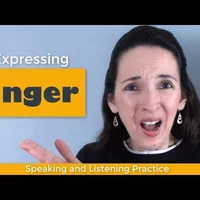Conversation Skills: Expressing Anger in English 😠 "Over My Dead Body" & More
Hi everyone. It's Jennifer.
If you've watched my lesson on swearing, you know that I do my best to avoid cursing, but one bad habit that I have is using sarcasm.
That's saying one thing but meaning another, for example, “Thank you. Thank you very much.”
When in reality, you're not happy at all with what someone just did.
In this short lesson, I'll go over a few expressions that people say in anger.
First: Don't do me any favors.
We say this when we think that someone is doing something for us, but they don't really want to.
This expression communicates that you're annoyed. For example:
Or maybe we think that what someone is suggesting can make things worse. For instance:
Here's a second expression: over my dead body.
This is used when we refuse or resist something. We feel strongly about getting our way, so we speak in anger.
We're basically saying, “That will only happen if you kill me first." Over my dead body.
Third: Don't make me laugh. This is similar to "Yeah. Right."
There's that tone of sarcasm.
It can be rude. We say this when we find another person's words to be ridiculous. For example:
Fourth expression: waltz (right) in and do something
A waltz is a smooth dance. So if someone waltzes in and does something, they do it easily and with confidence.
And this can be annoying. Someone might say:
You can combine that expression with our fifth one: Who do you think you are?
We ask this question in anger when we believe someone is acting beyond their accepted role. For example:
Well, hopefully, you won't have many reasons to get angry in the future, and I certainly don't want to encourage you to be rude, but you may hear others use these expressions,
and now you'll be better prepared to understand and deal with that kind of situation.
Here's a quick look again at the expressions we studied in this lesson.
That's all for now. I'll see you again soon for another lesson.
Please remember to like this video if you found it useful and subscribe if you haven't already.
As always, thanks for watching and happy studies!

